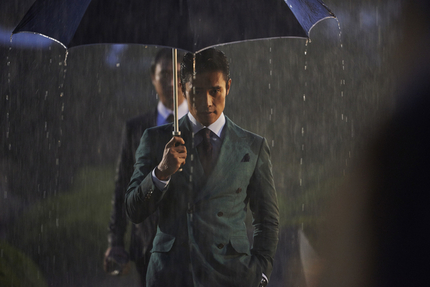Review: INSIDE MEN, A Political Thriller That Goes For The Jugular

The year is almost up, the box office has been tallied and the people have spoken. Stories of greedy corporate heirs, crooked clergy, conniving journalists and dirty politicians have risen to the top of the pile, each more acerbic than the last. But 2015 ends with a bang and one of the darkest, most fiercely critical mainstream Korean films of recent memory. Woo Min-ho ably surpasses his previous efforts with third feature Inside Men, which also marks a comeback of sorts for the embattled star Lee Byung-hun, who has spent much of the year in tabloid columns for the wrong reasons.
Following a small part in Terminator: Genisys and his roles as the villain in the risible Memories of the Sword, Lee plays the gruff, charismatic leader of a small gang who, through his connection to the chief of a major newspaper, becomes a fixer in the upper echelons of the political game in Seoul. His work thrusts him into an imbroglio involving a major corporation and a presidential candidate and soon he finds himself betrayed and without his right hand. Just as a young, morally-upright district attorney tries to fight the system and bring the crooked government and business figures down, the gangster quietly stages his revenge and comeback.
If Veteran profited from its skilful exploitation of a seeding discontent with the haves of Korean society, Inside Men exhibits a violent hatred of the greed and corruption that have scorched the country and which the public can no longer tolerate. It's not secret that politicians have played nice with lobbyists and their influential backers over the years, but the deep ties between former president Lee Myung-back and major corporate heads left a bad taste at the end of his presidential term and a more vocal electorate is expressing its growing dissatisfaction with current head of state Park Geun-hye through frequent demonstrations and sometimes riots in the streets of central Seoul.
Woo's film isn't bold enough to explicitly go after individual government figures, but the crooked corporation at the center of the story, Mirae Asset, is a real company with a building and logo that stretches far into the sky over the Cheonggyecheon stream, right by newspaper skyscrapers in front of the old palace in city center, which is where the story here begins, from a window overlooking the Blue House (presidential residence). The politicians in Inside Men, lying through their teeth, currying sexual favors and accompanied by scurrying, obsequious entourages, are presented as nothing short of gangsters.
With a beating electro score from Jo Young-wook (Oldboy, 2003) and vibrant and moody cinematography (Go Nak-seon) and lighting (Lee Seung-bin) from the team behind The Priests and The Fatal Encounter, Inside Men quickly establishes itself as one of the slickest Korean films of the year, with a mise-en-scene that is smooth but also immediately in service of the story, effortlessly imbuing the ambience of social distrust it explores.
Calling to mind his turn in Kim Jee-woon's A Bittersweet Life (2005), Lee is in very comfortable territory with his latest role, but also rises to the occasion by adding spurts of playful malevolence to his performance. Baek Yoon-sik (Save the Green Planet, 2003) also takes on a familiar part, but he's rarely been quite so effective as a smart and sinister villain. And then there's Cho Seung-woo as the incorruptible good guy, whose physicality and intensity make this easily his best role since Tazza: The High Rollers (2006).
After Man of Vendetta (2010) and his unfortunate sophomore effort The Spies (2012), director Woo Min-ho proves that he has a lot more to offer in this latest effort, gifting us a film that is confident in its execution and sharp in its writing. The third act, while satisfying, doesn't quite live up to the socio-political gambit he begins his tale with, but Inside Men remains rock solid entertainment.







